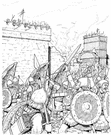siege
(redirected from sieges)Also found in: Thesaurus, Idioms, Encyclopedia.
siege
(sēj)n.
1. The surrounding and blockading of a city, town, or fortress by an army attempting to capture it.
2. A prolonged period, as of illness: a siege of asthma.
3. Obsolete A seat, especially a throne.
tr.v. sieged, sieg·ing, sieg·es
To subject to a siege; besiege: The invaders sieged the castle.
[Middle English sege, from Old French, seat, from Vulgar Latin *sedicum, from *sedicāre, to sit, from Latin sedēre; see sed- in Indo-European roots.]
American Heritage® Dictionary of the English Language, Fifth Edition. Copyright © 2016 by Houghton Mifflin Harcourt Publishing Company. Published by Houghton Mifflin Harcourt Publishing Company. All rights reserved.
siege
(siːdʒ)n
1. (Military)
a. the offensive operations carried out to capture a fortified place by surrounding it, severing its communications and supply lines, and deploying weapons against it
b. (as modifier): siege warfare.
2. a persistent attempt to gain something
3. a long tedious period, as of illness, etc
4. (Historical Terms) obsolete a seat or throne
5. (Military) lay siege to to besiege
vb
(tr) to besiege or assail
[C13: from Old French sege a seat, from Vulgar Latin sēdicāre (unattested) to sit down, from Latin sedēre]
Collins English Dictionary – Complete and Unabridged, 12th Edition 2014 © HarperCollins Publishers 1991, 1994, 1998, 2000, 2003, 2006, 2007, 2009, 2011, 2014
siege
(sidʒ)n., v. sieged, sieg•ing. n.
1. the act or process of surrounding and attacking a fortified place in such a way as to compel the surrender of the defenders.
2. any prolonged effort to overcome resistance.
3. a series of besetting illnesses or troubles: a siege of head colds.
4. a prolonged period of trouble.
5. Obs. a seat for a person of distinction; throne.
v.t. 6. to assail or assault; besiege.
Idioms: lay siege to, to besiege.
[1175–1225; Middle English sege < Old French: seat, derivative of siegier < Vulgar Latin *sedicāre to set « Latin sedēre to sit]
Random House Kernerman Webster's College Dictionary, © 2010 K Dictionaries Ltd. Copyright 2005, 1997, 1991 by Random House, Inc. All rights reserved.
Siege
of herons: company of herons, from the way the heron waits for its prey in the shallows at its feet, 1452.Examples: siege of bitterns, 1452; of cranes; of herons, 1452.
Dictionary of Collective Nouns and Group Terms. Copyright 2008 The Gale Group, Inc. All rights reserved.
siege
Past participle: sieged
Gerund: sieging
| Imperative |
|---|
| siege |
| siege |
Collins English Verb Tables © HarperCollins Publishers 2011
ThesaurusAntonymsRelated WordsSynonymsLegend:
Switch to new thesaurus
| Noun | 1. |  siege - the action of an armed force that surrounds a fortified place and isolates it while continuing to attack siege - the action of an armed force that surrounds a fortified place and isolates it while continuing to attackblockade, encirclement - a war measure that isolates some area of importance to the enemy armed forces, armed services, military, military machine, war machine - the military forces of a nation; "their military is the largest in the region"; "the military machine is the same one we faced in 1991 but now it is weaker" |
Based on WordNet 3.0, Farlex clipart collection. © 2003-2012 Princeton University, Farlex Inc.
siege
noun blockade, encirclement, besiegement We must do everything possible to lift the siege.
Collins Thesaurus of the English Language – Complete and Unabridged 2nd Edition. 2002 © HarperCollins Publishers 1995, 2002
siege
noun1. A prolonged surrounding of an objective by hostile troops:
2. An often prolonged period, as of illness:
bout.
The American Heritage® Roget's Thesaurus. Copyright © 2013, 2014 by Houghton Mifflin Harcourt Publishing Company. Published by Houghton Mifflin Harcourt Publishing Company. All rights reserved.
Translations
حِصار، مُحاصَرَه
obleženíobléhat
belejring
piirittääpiiritys
ostrom
umsátur
apgultis
aplenkums
obliehanie
obleganje
siege
[siːdʒ]Collins Spanish Dictionary - Complete and Unabridged 8th Edition 2005 © William Collins Sons & Co. Ltd. 1971, 1988 © HarperCollins Publishers 1992, 1993, 1996, 1997, 2000, 2003, 2005
siege
[ˈsiːdʒ] n → siège mto lay siege to [+ town, city, building] [army] → assiéger; [journalists] → assiéger
to be under siege [town, city] → être assiégé(e) (fig) (= under pressure) → être assiégé(e)
to be under siege from all sides → être assiégé(e) de toutes partssiege economy n → économie f autarciquesiege mentality n → mentalité f d'assiégé
to have a siege mentality → avoir une mentalité d'assiégé
Collins English/French Electronic Resource. © HarperCollins Publishers 2005
siege
Collins German Dictionary – Complete and Unabridged 7th Edition 2005. © William Collins Sons & Co. Ltd. 1980 © HarperCollins Publishers 1991, 1997, 1999, 2004, 2005, 2007
siege
[siːdʒ] n → assedioin a state of siege → in stato d'assedio
to lay siege to → porre l'assedio a
Collins Italian Dictionary 1st Edition © HarperCollins Publishers 1995
siege
(siːdʒ) noun an attempt to capture a fort or town by keeping it surrounded by an armed force until it surrenders. The town is under siege.
siege is spelt with -ie- (not -ei-).Kernerman English Multilingual Dictionary © 2006-2013 K Dictionaries Ltd.